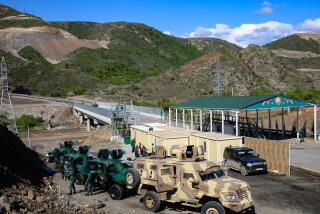Shultz Heading for Moscow Today : Little Hope Seen for Ending Arms Impasse With Soviets
- Share via
WASHINGTON — With diminishing hopes for significant progress, Secretary of State George P. Shultz leaves for Moscow today in an effort to end the impasse in U.S.-Soviet strategic arms negotiations and to advance some regional issues in the wake of last week’s settlement in Afghanistan.
The prospect of reaching a new strategic arms reduction treaty (START) before the next U.S.-Soviet summit begins May 29 has been dimmed by the lack of movement over the past month, a senior Administration official said Monday.
Although both sides have agreed in principle to reduce their arsenals of long-range nuclear missiles by half, negotiators in Geneva have failed to diminish the number of disagreements over the joint text of the proposed treaty and its three associated documents.
“It was 1,200 (disagreements)” in March, when Soviet Foreign Minister Eduard A. Shevardnadze visited here, the official said, “and it’s still 1,200.”
Technical Issues
About half of the differences are over such technical issues as definitions and could be resolved relatively easily. The rest, however, deal with substantive disputes over whether to limit three types of weapons--mobile ballistic missiles, sea-launched cruise missiles and air-launched cruise missiles--and how to verify compliance with such limits.
In Moscow on Thursday and Friday, U.S. and Soviet arms experts will be “sifting through the same three issues to see if they can get any closer,” said the Administration official, who asked not to be identified.
Other officials have expressed hope that because the Soviets have now agreed to pull out of Afghanistan, the superpowers can focus greater attention on the arms issue. But outside the State Department, virtually no government official expresses optimism that much more will be accomplished in U.S.-Soviet affairs during the rest of this Administration, particularly on arms control.
“The feeling in the Administration now,” said one non-governmental Soviet expert, “is that it’s more risky to rush headlong into a new treaty than to take a chance on missing the boat.”
The Senate still has not ratified the treaty banning medium-range nuclear missiles, which was signed by President Reagan and Soviet leader Mikhail S. Gorbachev last December. Members of Congress and Defense Department officials are openly skeptical about a new START agreement.
There is a widespread perception that the medium-range missile treaty was rushed to completion and that both sides should have time to reflect on and gain experience from the pact before the next major step is taken.
The State Department confirmed Monday that the Soviets have accepted the U.S. view that the medium-range missile treaty outlaws futuristic weapons, such as laser beams, that could be carried by such missiles.
The matter was not nailed down during negotiations, providing what Senate Majority Leader Robert C. Byrd (D-W.Va.) called “a hole in the treaty” that had to be filled before he would bring the pact to a Senate vote.
Hopes for ‘Better Reading’
This week’s meeting between Shultz and Shevardnadze should at least give each side a “better reading” of what substantive issues will lend themselves to progress at the summit, the Administration official said.
“After this ministerial meeting, both sides are going to have to make a call as to what really is achievable,” the official added. “I just don’t have a feeling at the moment” for what is attainable.
In addition, Shultz and Shevardnadze will discuss regional issues, including follow-up details of the Afghan settlement signed in Geneva last week, hostilities in the Persian Gulf and the Arab-Israeli conflict. The United States also wants Moscow to persuade the Marxist regime in Ethiopia to allow famine relief to reach an estimated 2 million starving people in the rebel portions of that nation.
The agenda also features human rights concerns, including the Soviet proposal to hold an international humanitarian conference in Moscow and the refusal by the United States and other Western nations to agree until the Soviets guarantee “wide-open participation” at the conference and improve their performance.
Demand for Access
As outlined in Vienna at the current meeting following the Helsinki Conference on Security and Cooperation in Europe, the West is demanding that the Soviets allow both private and governmental groups entry into Moscow and access to Soviet citizens.
It also wants the Kremlin to release the estimated 350 to 400 “prisoners of conscience” who are held for their religious and political beliefs and to allow increased emigration. “There has been no progress on any of these” since they were put to the Soviets in Vienna several months ago, the U.S. official said.
More to Read
Sign up for Essential California
The most important California stories and recommendations in your inbox every morning.
You may occasionally receive promotional content from the Los Angeles Times.













